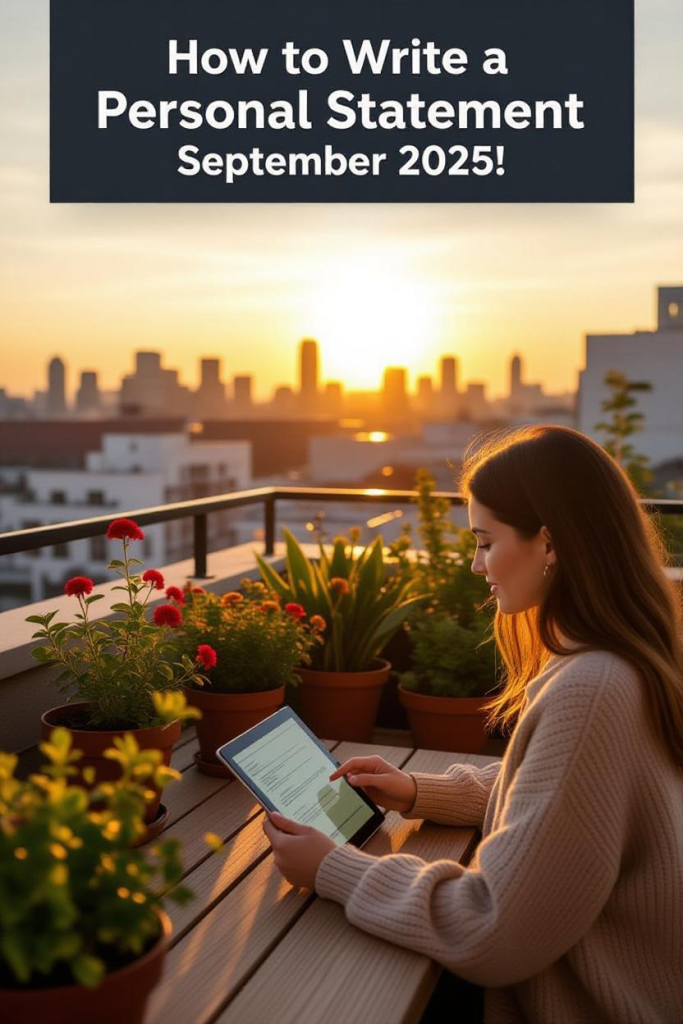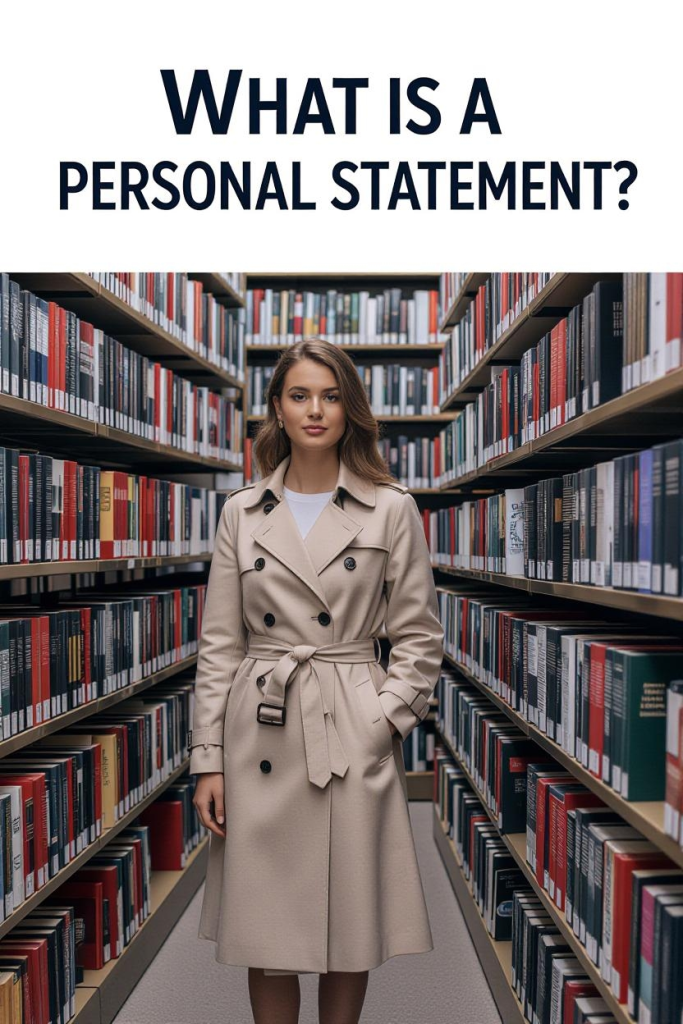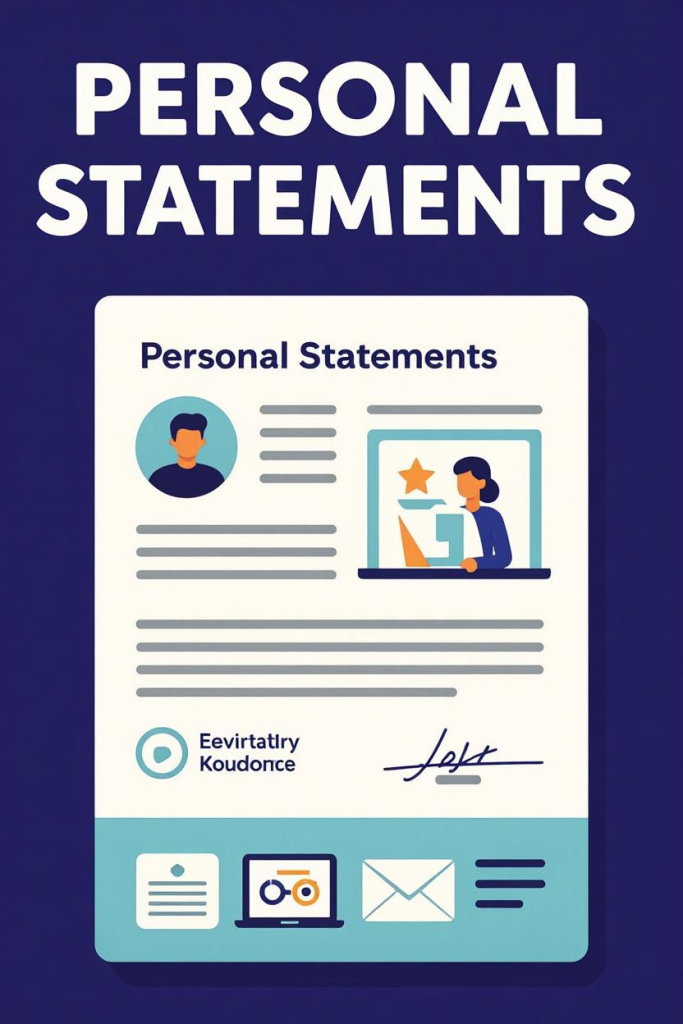
Meta Description
Learn how to write a personal statement that gets noticed from Essayassits.com. These proven tips will help you craft a compelling, authentic, and memorable personal statement for college, grad school, or job applications.
When you’re applying for college, graduate school, scholarships, or even jobs, the personal statement is one of the most important parts of your application. It’s your chance to show admissions officers or hiring managers more than just your grades, scores, or résumé. It’s your story—your chance to explain who you are, what drives you, and why you belong in their program or organization.
If you’re not sure where to begin, here are seven expert tips to help you write a personal statement that makes an impact. Essayassits.com will script top notch personal statements for you.

A personal statement is a written essay or narrative—usually one to two pages long—that highlights who you are, what motivates you, and why you’re a good fit for a particular opportunity.
It’s most often used for:
- College or university applications
- Graduate school or scholarship applications
- Job or internship applications
Key Features of a Personal Statement:
- Personal Storytelling – It goes beyond grades, scores, or résumés by sharing your background, interests, and experiences.
- Motivation & Goals – It explains why you want the opportunity and how it aligns with your long-term ambitions.
- Strengths & Skills – It demonstrates your qualities (leadership, resilience, curiosity, etc.) through real examples, not just adjectives.
- Fit – It shows why that specific program, school, or job is the right next step for you.
Example (simplified):
Instead of saying: “I am passionate about medicine.”
A strong personal statement might say: “When I volunteered at the local hospital, I witnessed how small acts of compassion—like explaining a diagnosis in simple terms—made patients feel at ease. That experience showed me the power of medicine not only to heal bodies but also to comfort people. It inspired me to pursue a career as a physician.”
👉 In short: a personal statement is your chance to tell your story in your own words and stand out as more than just an application form.
Would you like me to break down the different types of personal statements (academic vs. professional vs. scholarship) so you can see how they vary?

1. Begin With a Strong Hook
Essayassits.com advice’s that you should Start your personal statement with something that grabs attention right away. Instead of a generic opening like “I’ve always loved business,” tell a brief story or share a defining moment that sparked your interest. A memorable first line makes your reader want to keep going.
2. Show, Don’t Just Tell
Rather than listing qualities like “hardworking” or “passionate,” provide real-life examples. Did you lead a project that solved a tough problem? Did you overcome a challenge that shaped your perspective? Specific stories make your statement authentic and relatable.
3. Connect Past, Present, and Future
Your personal statement isn’t just about what you’ve done—it should also explain where you’re going. Connect your past experiences with your current goals and show how this program, school, or job fits into your future plans.
4. Be Authentic and Honest
Don’t write what you think admissions officers want to hear. Be yourself. Share your genuine motivations, challenges, and successes. Readers can spot insincerity quickly, but authenticity always leaves a lasting impression.
5. Stay Focused and Organized
Think of your personal statement as a mini-essay:
- Introduction: Start with a hook and introduce your theme.
- Body: Highlight 2–3 meaningful experiences that showcase your skills.
- Conclusion: Tie everything together with your goals and why this opportunity matters.
Avoid trying to include everything you’ve ever done—focus on quality over quantity.
6. Edit and Revise Thoroughly
A strong personal statement rarely comes together in one draft. Write freely at first, then refine your words. Read it out loud, cut unnecessary sentences, and make sure every detail contributes to your story. Feedback from mentors, teachers, or peers can be invaluable.
7. Pay Attention to Details
Before submitting, check spelling, grammar, and formatting. Make sure you’ve followed the word count and instructions. Small mistakes can make a big difference in how your statement is perceived.
Absolutely! A personal statement writing checklist makes a great blog add-on because it’s practical and shareable. Here’s a ready-to-use version you can post as a free resource or downloadable PDF.
Personal Statement Writing Checklist ✅
Use this checklist to make sure your personal statement is clear, polished, and ready to submit.
✔️ Before You Write
- I understand the prompt or question being asked.
- I’ve researched the program/job/school so I can tailor my statement.
- I’ve identified 2–3 key experiences I want to highlight.
✔️ Drafting Your Statement
- My opening has a strong hook (story, moment, or question).
- I “show” my qualities with real examples instead of just telling.
- I connect my past experiences with my present goals and future plans.
- My writing sounds authentic and true to my voice.
- I’ve stayed focused on a clear theme (not trying to cover everything).
✔️ Editing & Revising
- I’ve read my statement out loud to catch awkward phrasing.
- Every sentence adds value to my overall message.
- I’ve asked a mentor, teacher, or peer for feedback.
- I’ve checked grammar, spelling, and formatting.
✔️ Final Review
- My statement answers the prompt fully.
- I’ve respected word limits and submission guidelines.
- The conclusion ties everything together and leaves a strong impression.
- I feel confident that my statement represents me authentically
50+ topic ideas you can use when brainstorming for a personal statement
These are grouped by theme to make them easy to explore.
1. Academic & Intellectual Interests
- The class or subject that sparked your passion.
- A book, article, or research paper that changed how you think.
- A project, experiment, or presentation that challenged you.
- How you developed critical thinking or problem-solving skills.
- The first time you connected classroom theory to real life.
- A mentor or teacher who inspired your academic journey.
- Why a specific field (medicine, law, engineering, arts, etc.) excites you.
2. Personal Growth & Challenges
- Overcoming a personal setback or failure.
- A time you pushed yourself outside your comfort zone.
- How you built resilience during a difficult period.
- Balancing academics with personal responsibilities.
- A cultural or family experience that shaped your values.
- Lessons learned from moving to a new school or community.
- A challenge that made you rethink your identity or goals.
3. Leadership & Initiative
- Leading a team project or club.
- Organizing an event or campaign.
- Taking initiative when no one else stepped up.
- How you motivate or mentor others.
- Conflict resolution within a team.
- What leadership means to you beyond titles.
4. Service & Community Impact
- Volunteering at a local nonprofit or shelter.
- Helping others in your community (big or small).
- Advocacy for a social, environmental, or human rights issue.
- Tutoring, mentoring, or teaching someone a skill.
- Organizing a fundraiser or awareness campaign.
- How service changed your perspective on privilege or responsibility.
5. Global & Cultural Experiences
- Traveling abroad and what you learned from it.
- Being bilingual or navigating multiple cultures.
- Immigration, relocation, or adapting to a new culture.
- A global issue (climate change, inequality, etc.) you care deeply about.
- How cultural traditions shaped your identity.
6. Achievements & Passions
- A competition, contest, or award you worked hard for.
- An artistic performance or creation you’re proud of.
- A sport that taught you discipline and teamwork.
- Developing a unique skill or talent.
- Turning a personal hobby into something impactful.
7. Innovation & Problem-Solving
- Building or designing something new.
- Solving a problem with creativity or technology.
- Entrepreneurship—starting a business, club, or project.
- Using research to answer a meaningful question.
- Collaboration on a group innovation or challenge.
8. Future Goals & Aspirations
- Why you want to pursue a specific career path.
- A role model whose career inspires you.
- How your background connects to your professional dreams.
- Long-term goals to impact your community or the world.
- A vision of the person you hope to become.
9. Unique & Personal Stories
- A childhood experience that still motivates you.
- How a personal loss shaped your resilience.
- A lesson from failure that changed how you see success.
- The “aha” moment that made you decide on your field.
- How a seemingly small event had a huge impact on your life.
- A time when your perspective differed from others and you grew from it.
👉 The best personal statement topics usually:
- Come from real, specific experiences (not vague claims).
- Show your growth, resilience, and self-awareness.
- Connect your past to your future goals.
FAQs: How to Write a Personal Statement That Stands Out in September 2025

1. What is the purpose of a personal statement?
A personal statement highlights who you are beyond grades and test scores. It allows you to share your motivations, experiences, and goals, helping admissions officers or employers understand why you’re a strong fit for their program, school, or organization.
2. How long should a personal statement be in 2025?
Most personal statements are 500–800 words (1–2 pages, single-spaced). However, always check the specific requirements of the institution, as some may set strict word limits.
3. What should I include in my personal statement?
A strong personal statement typically covers:
- A hook or opening story that captures attention.
- Key experiences that shaped your interests or skills.
- Qualities and strengths shown through real examples.
- Future goals and how the program or opportunity aligns with them.
4. How do I make my personal statement stand out in 2025?
- Use a unique personal story instead of clichés.
- Focus on specific details (show, don’t just tell).
- Write in your own authentic voice.
- Customize it for each school, job, or scholarship.
5. What mistakes should I avoid in my personal statement?
Common mistakes include:
- Being too generic or using overused phrases (“I’ve always been passionate about…”).
- Listing achievements without connecting them to your story.
- Ignoring the prompt or exceeding word limits.
- Submitting without careful proofreading.
6. Can AI tools help me write a personal statement in 2025?
Yes—AI tools can help brainstorm ideas, check grammar, or polish language. However, your voice and story must remain authentic. Admissions officers want to hear from you, not an AI. Use AI as a support tool, not a replacement.
7. Should I write one personal statement for all applications?
No. While you can reuse parts of your personal statement, it’s best to tailor each version to the
Conclusion
Writing a personal statement can feel overwhelming, but remember—it’s your chance to share your unique voice and perspective. With the right structure, authentic storytelling, and thoughtful revision, you can write a personal statement that not only meets the requirements but also truly stands out.
👉 Pro Tip: If you’re publishing this on a blog, we can also add a call-to-action (CTA) at the end—like inviting readers to download a free worksheet or checklist on personal statement writing.
Would you like me to draft that personal statement writing checklist as a free downloadable/blog add-on?
